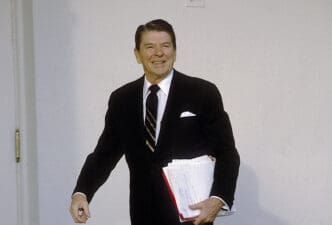Executive Summary
The Story So Far
Why This Matters
Who Thinks What?
President Donald Trump recently canceled trade negotiations with Canada, citing dissatisfaction with an advertisement released by the government of Ontario. The ad, which aired in the U.S., featured excerpts from President Ronald Reagan’s 1987 radio address on fair trade, prompting Trump to label it as “fake” despite its use of actual clips from Reagan’s speech. This incident highlighted a significant divergence in the two presidents’ approaches to tariffs and international trade policy.
Reagan’s Use of Tariffs
The ad’s use of Reagan’s remarks occurred as Trump’s administration has frequently employed tariffs as a key tool in its trade strategy. Reagan’s 1987 address, from which the ad drew, was delivered in the context of him imposing 100% tariffs on Japanese laptop computers, power tools, and television sets.
This action was a response to Japan’s alleged failure to adhere to a 1986 agreement regarding the dumping of semiconductor chips, which Reagan viewed as harming American producers. While Reagan did utilize tariffs, his administration framed them as a reluctant measure, emphasizing a commitment to both “free trade” and “fair trade.” Officials, including White House chief of staff Howard Baker, stated that these were steps they were forced to take, not desired actions.
Contrasting Philosophies
In contrast, Trump has frequently levied tariffs against numerous countries, justifying them with a broad array of reasons that have included claims of unfair trade, alleged drug-trafficking, Denmark’s refusal to sell Greenland, and even personal displeasure over the Canadian ad. His initial worldwide tariffs often focused on trade imbalances rather than specific unfair policies.
Reagan consistently condemned protectionism, describing it in 1988 as “a cheap form of nationalism” and in 1985 as “almost always self-destructive.” He explicitly stated that “protectionism is not the way to resolve our trade imbalance.”
Trump has taken a markedly different stance, hailing tariffs as powerful tools for American manufacturing and famously calling “tariffs” the “most beautiful word in the dictionary.” He also diverged from Reagan’s view on the Smoot-Hawley tariffs of 1930, which many historians believe worsened the Great Depression; Trump claimed the Depression “would have never happened if they had stayed with the tariff policy.”
Furthermore, Reagan was clear in his belief that trade wars were detrimental and should be avoided, whereas Trump has asserted that “trade wars are good, and easy to win.” Historically, Reagan often found himself in opposition to a Congress that sought to impose more protectionist measures, repeatedly vetoing bills he deemed excessively protectionist. Both presidents, however, demonstrated a desire to maintain executive authority over trade policy, with Reagan notably vetoing legislation that called for tougher retaliation against countries like Japan.
Key Divergence
The recent episode involving the Canadian ad and President Trump’s response underscores the fundamental differences between his and President Reagan’s philosophies on trade. While Reagan viewed tariffs as a last resort for specific, proven trade violations and advocated for free trade, Trump has embraced tariffs as a primary economic tool, often for broader strategic or even retaliatory purposes.








